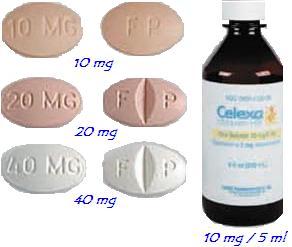| iPsychology
|
|
Celexa ( Citalopram ) Celexa ( Citalopram ) is used to treat major depression. Celexa ( Citalopram ) may also be used for purposes other than those listed in this medication guide.Celexa ( Citalopram ) is in a class of drugs called selective serotonin reuptake inhibitors. Celexa ( Citalopram ) affects chemicals in the brain that may become unbalanced and cause depression. You cannot take Celexa ( Citalopram ) if you have taken a monoamine oxidase inhibitor ( MAOI ) such as isocarboxazid ( Marplan ), phenelzine ( Nardil ), or tranylcypromine ( Parnate ) during the last 2 weeks. A dangerous drug interaction can occur if citalopram is combined with any of these medications.
Strengths:
Dosages: Actual dosage must be determined by a physician.
Normal dosage:
Problems with:
Test:
Take With: With or without food and with a full glass (8 ounces) of water, it the same time everyday. Full Benefits In: Several months. Missed Dose(s): If within one hour take, if over an hour skip and then continue on your normal schedule. If Stop Taking: Do not stop without consulting your physician. Overdose symptoms include: Nausea, vomiting, tremor, drowsiness, dizziness, sweating, and a fast heartbeat. Warnings
Do not take citalopram without first talking to your doctor if you have had an allergic reaction to either medication in the past. Celexa ( Citalopram ) is in the FDA pregnancy category C. This means that it is not known whether Celexa ( Citalopram ) will be harmful to an unborn baby. Do not take Celexa ( Citalopram ) without first talking to your doctor if you are pregnant or could become pregnant during treatment. Celexa ( Citalopram ) passes into breast milk and may affect a nursing infant. Do not take Celexa ( Citalopram ) without first talking to your doctor if you are breast-feeding a baby.. Celexa ( Symptoms or Effects ) Common: Abdominal pain, agitation, anxiety,diarrhea, drowsiness, dry mouth, ejaculation disorders, fatigue, impotence, indigestion, insomnia, loss of appetite, nausea, painful menstruation, respiratory tract infection, sinus or inflammation, sweating, tremor, and / or, vomiting. Less Common: Amnesia, attempted suicide, confusion, coughing, decreased sexual drive, depression, excessive urination, fever, gas, impaired concentration, increased appetite, increased salivation, itching, joint pain, lack of emotion, loss of menstruation, low blood pressure, migraine, muscle pain, rapid heartbeat, rash, skin tingling, taste disturbances, visual disturbances, weight gain, weight loss, yawning Rare: Abnormal dreams, acne, aggressive behavior, alcohol intolerance, angina ( chest pain ), arthritis, belching, bone pain, breast enlargement, breast pain, bronchitis, bruising, chills, conjunctivitis (pinkeye), decreased muscle movements, delusions, dermatitis, difficulty breathing, difficulty swallowing, dizziness, drug dependence, dry eyes, dry skin, eczema, emotional instability, excessive milk flow, excessive muscle tone, eye pain, fainting, feeling of well-being, flu-like symptoms, flushing, frequent urination, gum inflammation, hair loss, hallucinations, heart attack, heart failure, hemorrhoids, high blood pressure, hives, hot flashes, inability to hold urine, inability to urinate completely, increased sex drive, increased urination, involuntary muscle movements, leg cramps, mouth sores, muscle weakness, nosebleeds, numbness, painful erection, painful urination, panic, paranoia, pneumonia, psoriasis, psychosis, ringing in the ears, sensitivity to light, skin discoloration, slow heartbeat, stomach and intestinal inflammation, stroke, swelling, teeth grinding, thirst, uncontrollable muscle movements, unsteady or abnormal walk, vaginal bleeding. See physician always: An allergic reaction (difficulty breathing; closing of the throat, swelling of the lips, tongue, or face, or hives),
an irregular heartbeat or pulse,
low blood pressure ( dizziness, weakness ),
high blood pressure ( severe headache, blurred vision ), or See physician if severe: Headache, tremor, nervousness, anxiety, nausea, diarrhea, dry mouth, or changes in appetite or weight, sleepiness or insomnia, decreased sex drive, impotence, or difficulty having an orgasm. See physician NOW: An allergic reaction ( difficulty breathing; closing of the throat, swelling of the lips, tongue, or face, or hives ),
an irregular heartbeat or pulse,
low blood pressure ( dizziness, weakness ),
high blood pressure ( severe headache, blurred vision ), or Celexa ( Citalopram ) Interactions
|

